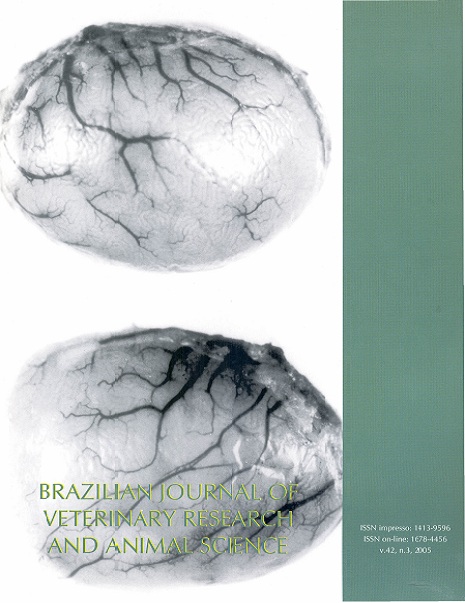Uso de acondicionamento ambiental para matrizes suínas em gestação
DOI:
https://doi.org/10.11606/issn.1678-4456.bjvras.2005.26435Palavras-chave:
Ambiência, Gestação, Resfriamento, Adiabático, SuínosResumo
O efeito das altas temperaturas sobre os animais tem sido extensivamente estudado a fim de se obter a situação ideal de alojamento, com melhor desempenho, tanto produtivo como reprodutivo. O objetivo deste trabalho foi avaliar o efeito do resfriamento adiabático associado à ventilação controlada (SRAVC), utilizado no alojamento de matrizes suínas gestantes, no seu desempenho reprodutivo. Foram comparados dois tipos de sistemas SRVC e ventilação natural (Natural). Um total de 144 matrizes Dalland® foram alojadas em duas diferentes estações, verão e inverno, resultando em 4 tratamentos (33 matrizes cada): sistema controlado com ventilação forçada e nebulização durante o verão (SRAVC/Verão); sistema de ventilação natural durante o verão (Natural/Verão); sistema controlado com ventilação forçada e nebulização durante o inverno (SRAVC/Inverno) e sistema de ventilação natural durante o inverno (Natural/Inverno). O sistema era regulado a partir de um termostato onde os ventiladores eram acionados a uma temperatura ambiente de 25ºC e a nebulização a 27ºC, permanecendo ligada por cinco minutos e desligada durante 20 minutos. Foram avaliados os seguintes parâmetros produtivos: número de leitões nascidos vivos (NV), número de mumificados (MF), número de natimortos (NM), peso médio ao nascer (PN), número de leitões desmamados (NLD), peso médio ao desmame (PD) e ganho de peso dos leitões (GP). O sistema SRAVC proporcionou a redução do número de leitões mumificados no plantel, enquanto a estação do ano contribuiu para melhorar no peso ao desmame dos leitões.Downloads
Referências
Downloads
Publicado
Edição
Seção
Licença
O conteúdo do periódico está licenciado sob uma Licença Creative Commons BY-NC-SA (resumo da licença: https://creativecommons.org/licenses/by-nc-sa/4.0 | texto completo da licença: https://creativecommons.org/licenses/by-nc-sa/4.0/legalcode). Esta licença permite que outros remixem, adaptem e criem a partir do seu trabalho para fins não comerciais, desde que atribuam ao autor o devido crédito e que licenciem as novas criações sob termos idênticos.





